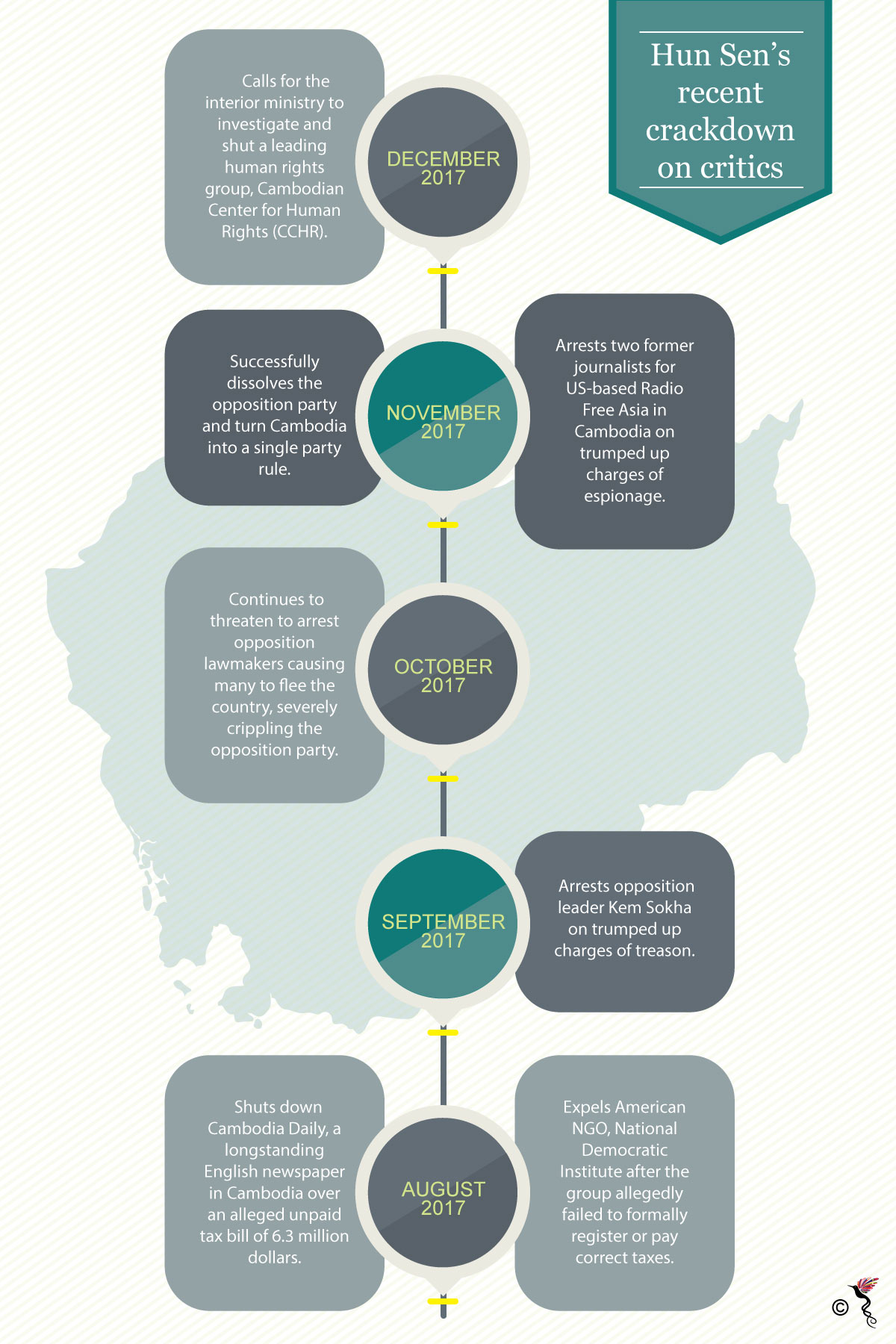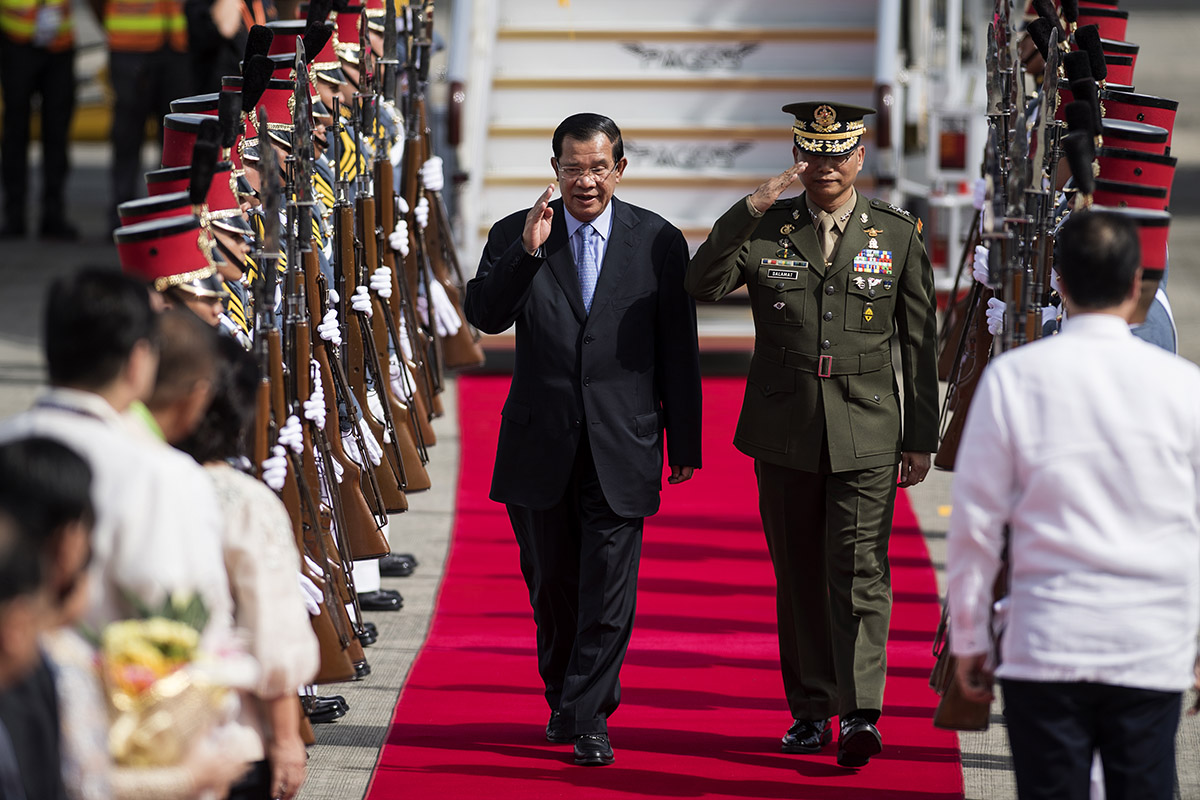With Beijing smiling down upon him – showering the developing country with investments minus any obligations to human rights and democracy – Cambodian Prime Minister, Hun Sen continues his iron fist rule without any fear of opposition.
His most blatantly undemocratic move was to dissolve the existing opposition party, the Cambodian National Rescue Party (CNRP) which was met with immense condemnation by the western world.
Now, he is going after the Cambodian Center for Human Rights (CCHR), a leading human rights group, set up by embattled Cambodian opposition leader, Kem Sokha. According to Hun Sen, the CCHR must be shut down because “it does what it’s told by foreigners.”
Reacting to this, Asia Director at Human Rights Watch, Brad Adams said that “Hun Sen’s increasing attacks on Cambodia’s human rights groups are nearing the point of no return. Without a legitimate political opposition in the country, Cambodians need a vibrant and independent civil society more than ever.”
“Foreign intervention, threatening the sovereignty of Cambodia”, is the same line of argument used by the premier in a bid to strengthen his dominion over the state with elections looming in March 2018. In November 2017, two former journalists for US-based Radio Free Asia in Cambodia were detained on trumped up charges of espionage. It was also the reason why he went after Kem Sokha for allegedly conspiring with Washington to overthrow his regime.
But amid all of this, China has remained relatively silent, in tacit approval of Hun Sen’s actions. The death knell dealt to Cambodian democracy did not seem to affect Beijing’s continued investment into Cambodia. Most recently, Chinese firms had pledged to invest seven billion dollars in development projects including an expressway connecting the capital, Phnom Penh and the coastal port city of Sihanoukville, a satellite city just outside of the capital, a tourism centre and the launching of a commercial bank.
Criticism by the international community doesn’t seem to have any effect on Hun Sen’s grip on Cambodia. According to analysts and observers, the premier who has led Cambodia for over 30 years is emboldened by the support he receives from Beijing – even switching his foreign policy posture from favouring the US to one that favours China.

Hun Sen’s recent clampdown on critics and dissidents
Censuring Hun Sen
The US State Department, in a rare effort to punish the country for its clampdown of democracy, said that it would bar Cambodian officials deemed to have been "undermining democracy" from entry to the US. The move was a "direct response to the Cambodian government's series of anti-democratic actions."
However, Phnom Penh laughed off efforts by Washington – the latter themselves being increasingly inconsistent with their policy on upholding values of democracy and human rights in the international foray.
"If Cambodian people cannot go to US, it is okay, it is not a problem. If we cannot join any meetings in the US, there are many other meetings outside the US that we can join," Cambodian government spokesman Sok Eysan was quoted as saying by Agence France Presse.
At a regional level, there has been no palpable action towards Hun Sen’s clampdown. While the Association of Southeast Asian Nations (ASEAN) Secretariat may not have the mandate to be releasing statements in favour or against such deeds, no other ASEAN member state has voiced their disapproval of Hun Sen’s dictatorial ways.
On Monday, several Members of Parliament (MPs) from around the ASEAN region joined hands with their counterparts representing 23 countries across six continents, to state their concerns over the arrest and detention of Kem Sokha in an open letter to Hun Sen.
Congressman Tom Villarin of the Philippines, who signed the letter, called on the Cambodian government to “show a commitment to working with its international partners, including those who have been critical of its recent actions, in addressing what we see as serious breaches of international law and Cambodia’s own constitution.”
“The overwhelming support shown by lawmakers from around the world by signing on to this letter shows that the situation in Cambodia is not one that the international community is going to ignore. Prime Minister Hun Sen would do well to pay attention to our recommendations or risk becoming a pariah on the global stage,” said another signatory, Charles Santiago, a Malaysian parliamentarian and President of the ASEAN Parliamentarians for Human Rights (APHR).
However, the sad truth is that words and tepid actions have come to no avail in forcing Hun Sen’s hand into loosening his hold on Cambodia. With him slated to be re-elected come March 2018, there seems to be nothing the world can do but to watch his onslaught on the values of democracy and human rights continue.
Recommended stories:
